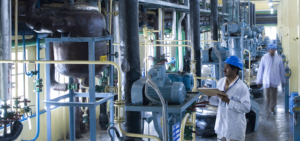With technology racing onward, drugs are becoming more complex than ever before – along with their active ingredients and the processes that produce them.
 Different Challenges, Different Scales – The Balancing Act
Different Challenges, Different Scales – The Balancing Act
To some extent, the challenges of commercial API manufacturing vary, based on scale. A large-scale CMO might not necessarily be suited to working in an early stage of development. Applying later-stage standards early on, for example, could waste time and money – ultimately derailing the project timeline and budget. At the same time, consideration must always be given to later-stage manufacturing processes & requirements during earlier phases of the project to maximize efficiency and minimize cost & time-to-market. It requires striking a balance – maximizing early-stage success while minimizing challenges in the future.
Scale-Up Gradually to Identify & Solve New Challenges at Each Stage
Many aspects of early-stage production, such as handling and storing raw materials, only become challenging when production is scaled up. Issues with heat generation and dissipation also tend to come to the forefront when production is dramatically increased. In addition, larger volumes often mean longer reaction times. This can be problematic for certain processes.
To detect and resolve these potential issues, production is scaled gradually, going from micro or milligram scale to gram scale, then pilot scale to full production.
Lifecycle Management Key to Successful Process Scale-Up
When preparing to scale up drug production, it’s important to partner with a CMO well-versed in lifecycle management. A contract firm that has the extensive expertise needed to work comfortably at all scales can improve many aspects of the scale-up process in measurable ways, making it smoother, faster, and easier overall.
The issues that arise when shifting from one scale to another can be unpredictable, and because of this, planning and forecasting should be done as early in the R&D process as possible. The more experienced the transfer team, the more streamlined and simplified the technology transfer can be.
Several techniques are currently used to make production more efficient. Scouting alternate synthetic routes to a molecule has become standard, and helps control costs by accelerating production. This can also reduce time spent on regulatory compliance, as there are less steps to document, and less analysis to be made throughout the process.
Consider Your Infrastructure: Analyze Processes, Steps, Chemicals & Reagents
We often manage projects with compounds from the earliest stages at Neuland in which compounds are produced in small trial batches. With subsequent scale-up steps on the horizon, however, we always advise our earlier stage clients to consider the discharge, infrastructure and cost of the processes used. We systematically analyze how each process, step, chemical, or reagent can potentially affect the product when it begins manufacture on a larger scale. One solution we and other API manufacturers are increasingly turning to is green chemistry.
In green chemistry:
- Processes are designed to maximize the amount of raw materials in usable products
- Operations are designed to use less energy and to maximize energy efficiency overall
- Environmentally safe or benign products are used whenever possible
- Waste is avoided as much as possible
By following these principles, the processes used for larger scale API manufacturing can become more efficient.
- Reactions use less steps, and fewer resources are consumed to yield more product.
- Operations are simpler, and conducted at ambient temperature and pressure.
- Workplaces became safer overall, as they house less toxic solvents and less hazardous waste products.
- Processes require less heat, less pressure, and less protective equipment.
The reduction in hazardous materials and wastes also helps decrease the time spent tracking, managing, and reporting on safety.
While always beneficial for Environmental Health and Safety (EHS) reasons, green chemistry can significantly reduce waste and cost. In addition, it can also be the key element that enables a drug to be manufactured commercially.
Neuland always takes care to maintain a holistic approach when it comes to API chemistry. By reflecting early in the process on how a product can be manufactured on a commercial scale later on, we ensure the long-term viability for which our customers rely on us.
What challenges have you faced when scaling up your production, and how have you overcome them?










